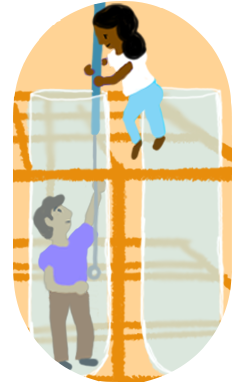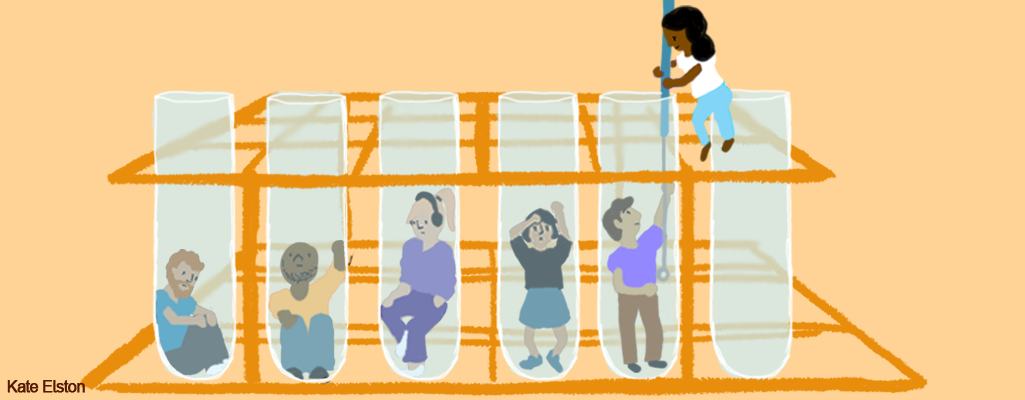No one had prepared me for how alone I would feel. I knew grad school would be challenging. I’d be thrown into projects and expected to think critically and independently as a scientist. The first two years, in particular, were a struggle. Not only was I beginning a 5-6 year degree, but I was also in an entirely new city with no support system other than my then-boyfriend, now-fiance. Year one, I was feeling unstable without a permanent lab. I couldn’t really explain my struggles with family and friends back home because I was the first to attend a graduate program. They didn’t realize that finding a permanent lab wasn’t a guarantee, that I wouldn’t be getting summers off, and that while I was earning a graduate student stipend, I didn’t have the funds to travel across the country for reunions and weekend vacations.
Year two, I found stability in a permanent lab. I felt safer, but that was when new challenges began. I was fighting to get out of my undergrad research assistant mentality and to learn how to be an independent thinker. Everyone told me that graduate school could be pretty isolating and that it would get to a point where I would be the main expert on my project. My advisor would slowly become more hands-off and I’d be designing experiments, troubleshooting, and analyzing data alone. I saw my cohort even less as we finished up classes and joined permanent labs. I joined a lab in the Pharmacy building, and while I was a short walk from NMS and MBB, I was the only ILS graduate student in the building for a long time.
For three years, I remained the youngest in my lab, and it seemed like the older students had everything together. They seemed happy and content to silently work and really only converse during lab meetings. As the dread of my qualifying exam loomed in the not-so-distant future, I kept quiet about my worries and struggles. Despite being a biologist, I was put on organic synthesis projects and I started feeling defeated by the constant troubleshooting and my imposter syndrome. To avoid being “found out”, I avoided socializing with people in the program. I endured a broken engagement while studying for quals which isolated me further. I had some friends reaching out and checking in on me, but for the most part, I was entirely alone. The problem was, I didn’t know how to make friends as an adult. To be honest, I’m still not really sure how to do it.
My parents came to help me move and deal with the stress of canceling a wedding. Shortly thereafter I rediscovered my love of books and escaped to reading. I had some friends asking to see me, but I was too ashamed to meet up with them. It was around this time that I realized I needed to make some major changes in my life. First, I started taking care of myself. I recognized that while loneliness could be devastating, I could also embrace it too. I took myself out to eat, went to the movies alone, and enjoyed sunny days at the park with my dog. I remembered how to be me without defining my value through my relationship or success in the lab. I started branching out and asking people to meet for coffee on weekends. I didn’t wear my headphones in the lab as much and started asking questions despite my fear of people thinking I was dumb. Although I’m an introvert, I forced myself to reach out because I knew I couldn’t keep going alone, and I realized that it wasn’t anyone’s job to make sure I had a buddy. Sometimes, I would need to be the one to take initiative. I would need to be the one to speak up. No one would read my mind to know how I was feeling.
Since then, I’ve created a solid support system. My fiance and I have reconciled. I am the senior member in the lab, and when rotation students and new members join, I ask them if they’d like to join me for coffee. No one had done that for me, but I see how much more comfortable people feel collaborating and asking questions once they’ve gotten to know each other more outside of the physical lab space.
While interacting with more grad students, I quickly realized that we all have shared some feelings of isolation. We just don’t talk about it. I was curious how others have combated isolation and built support systems while at a new university, in a new city, state, even country. To see how fellow students handled these challenges, I reached out to people for some advice and tips on how they built their support systems.

“As an international student who has come to this country for the first time, the first several months were the toughest. My advice is to stay occupied. Working out, cooking, sightseeing, and joining any events that you might be interested in.”
Xin, a third-year international student
“Being social and feeling connected looks different for everyone, so whether it’s one friend or ten, find what works for you. I tend to be pretty introverted, so it took me a while to find the right balance.”
Anonymous
“ I thought of grad school as starting a new job. I have a rule for starting a new job: it takes about a month or so to fully adjust to a new environment, so I have to wait a least a month before I can judge if the job is the right fit for me. For grad school, however, I think my one-month rule was underselling it quite a bit – I don’t think I felt fully adjusted grad student until well after my first year was over (and by ‘adjusted’ I mean happy and fulfilled). That being said, everyone adjusts to grad school at their own pace, so don’t freak out if you feel like your transition is not as easy as your peers!”
Anonymous
*Quotes have been edited for clarity

Leave a Reply